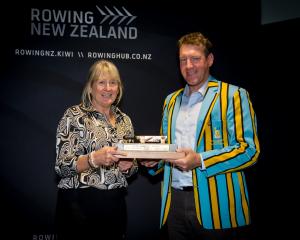The New Zealand rowing team came to the world championships with great expectations and left its fans happy at the end of the regatta.
Friday was disappointing, Saturday golden and yesterday magic.
The New Zealanders were expected to win 10 medals at Lake Karapiro and came up trumps with three gold, three silver and four bronze.
Fourteen of the 18 crews qualified for the finals and New Zealand was third on the list of gold medal winners.
Great Britain topped the points table with 99, Germany had 84 and New Zealand 76.
Britain had the most medals with 11, New Zealand 10 and Germany 9.
It was New Zealand's best medal haul at a world championships since it first competed in 1971.
The previous best medal haul was at Eton, England, in 2006 when six medals were won - gold to Mahe Drysdale in the men's single sculls, two silver and three bronze.
There has been a huge change in the mental approach by New Zealand rowers this century, and most of the national team now expect to win medals.
Before that, the goal of international competition was to gain experience.
Just making the A final was an added bonus.
The new positive approach was evident at Karapiro, where most of the crews performed up to form.
Some of the younger rowers who were promoted from the under-23 world championships performed above expectations.
The rowers paid a tribute to the partisan New Zealand crowd that roared their support in the last 500m of races.
They played their part yesterday and spurred the host on to two more medals.
Nathan Cohen and Joseph Sullivan came with a late rush to to pass Great Britain 100m out and win the gold medal in the men's double sculls with a time of 6min 22.63sec.
The Great Britain pair of Matthew Wells and Marcus Bateman clocked 6min 24.21sec.
Cohen (23) was ecstatic.
"I'm still shaking," he said.
"I can't quite believe it. It's a dream come true.
"We achieved something we have trained for all our life in in just over six minutes."
Cohen and Sullivan had a disappointing time at World Cup regattas in Europe this year and changed things when they got back home.
"We went back to our own boat, threw away all the data and numbers and just followed what we had to do," Cohen said.
"As soon as we did that, things started to click and we got self-belief in each other."
The duo knew Great Britain was a strong crew and would go out hard at the start.
The New Zealanders stayed close and with 250m to go they let fly.
"Nothing was going to stop us," Cohen said.
"We went out full blinkers and charged for the line."
The silver medal went to Louise Ayling in the women's lightweight single sculls.
She left her charge even later than the men.
Ayling, fourth with 250m to go, passed Brazil to get in the bronze position then sneaked past Italy 20m from the line.
Marie-Louise Draeger (Germany) won gold medal convincingly in 7min 43.45sec.
Ayling recorded 7min 48.48sec and Laura Milani (Italy) was third in 7min 49.48sec.
"I dreamed for the gold but I'm stoked with the silver," Ayling said.
"It's something I never thought I could achieve in my life."
It was a remarkable reversal of form by Ayling, who failed to gain selection for the World Cup after this year's New Zealand championships and the national trials.
She was confused at the finish and did not know her place when she crossed the line.
"I had no idea where I finished. It was a fantastic feeling when I found out I'd nobbled the silver medal," she said.
New Zealand crews first competed at the world championships at St Catherines, Canada, in 1970, and before these championships had won 49 medals: 23 gold, 13 silver and 13 bronze.
When the event was last held at Karapiro, in 1978, New Zealand collected only one medal, bronze in the men's eight.
The past decade has been the most productive period, with Kiwis bagging 36 medals: 18 gold, 10 silver and eight bronze.
The medal rush started in Lucerne, Switzerland, in 2001 when New Zealand won three silver medals.
It was a gold rush four years later in Gifu, Japan, when four New Zealand crews came home first.
They repeated that feat in Poznan, Poland, last year, also adding a bronze medal.
Mahe Drysdale (four) has won the most gold medals for New Zealand.
His run started in Gifu in 2005, and he won in 2006, 2007 and 2009.
Philippa Baker won three gold medals: the lightweight single sculls in 1991 and the women's pairs with Brenda Lawson in 1993 and 1994.
Baker also won two bronze medals.
Hamish Bond and Eric Murray both gained their third gold medal at Lake Karapiro on Saturday.
NZ medals
At Karapiro
Gold
Men's pair (Hamish Bond, Eric Murray).
Women's pair (Juliette Haigh, Rebecca Scown).
Men's double sculls (Nathan Cohen, Joseph Sullivan).
Silver
Men's lightweight coxless pair (James Lassche, Graham Oberlin).
Men's single sculls (Mahe Drysdale).
Women's single sculls (Louise Ayling).
Bronze
Men's adaptive single sculls (Danny McBride).
Men's coxless four (David Eade, Jade Uru, Hamish Burson, Simon Watson).
Men's lightweight double sculls (Peter Taylor, Storm Uru).
Women's single sculls (Emma Twigg).












